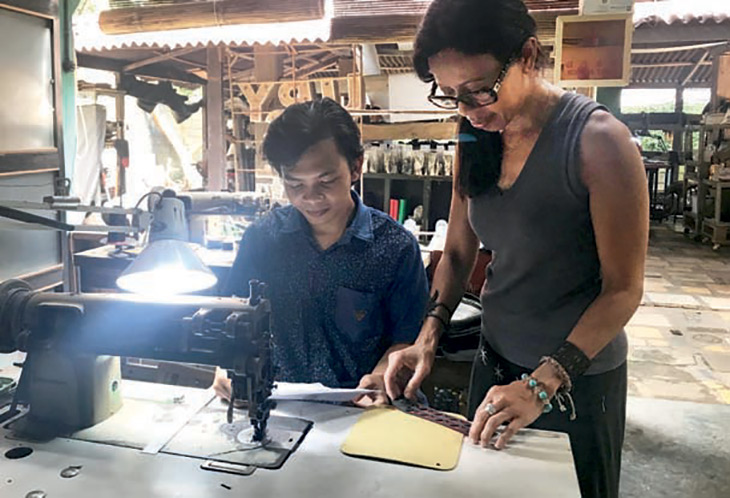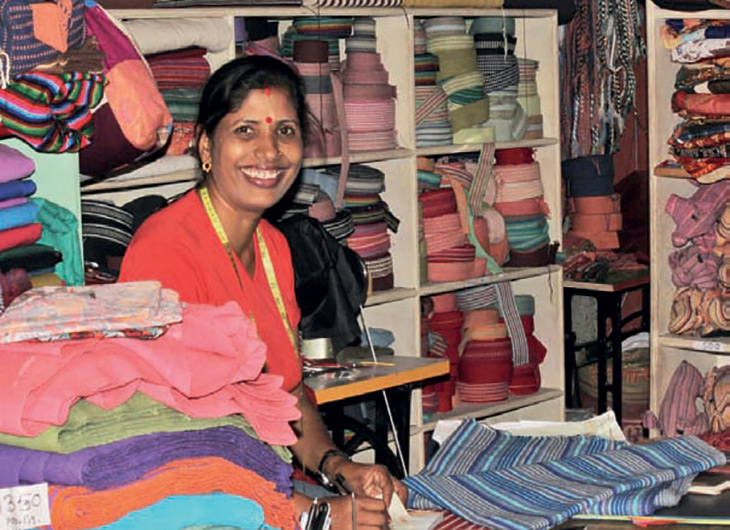Stories > Weaving a New Future
Weaving a New Future
Purnama Outreach’s co-founder, Rae Amarullah, shares how the fashion-based social enterprise empowers marginalised communities for long-term betterment.
BY Therese Tay
ae Amarullah’s journey of trying to uplift lives started with a big move of her own. When the American educator and her husband, Charles, relocated from the US to Singapore in 2008, the couple began travelling around the region, and saw plenty of opportunities to support communities in remote rural areas.

“We began directly assisting the education of children in Southeast Asia.” Donations came from the couple as well as their friends and family, with the latter group helping to administer the contributions to those in need.
Soon, however, she says the concept became unsustainable. “Our ambitions grew beyond just paying for education and our impact communities were still dependent on income produced in a distant land,” she recalls. “If we wanted to use our skills to help reduce inequality, the model of accepting donations seemed incongruous.”
There was also the question of continuing with the project if their personal situations change, adds the supply chain director. Bearing in mind the proverb, “Give a man a fish, and you feed him for a day; teach a man to fish and you feed him for a lifetime”, the couple decided that instead of just giving money, they would focus on helping those in need integrate into an increasingly global society.
“During our regional travels, we personally enjoyed discovering local artisanal products, as well as the fact that there could be a real global market for designing modern fashion and accessories using traditional methods,” she says.
The couple set-up Purnama Outreach, a social enterprise based in Singapore, which they felt provided the best base to work out of in the region because “everything is so well-organised and transparent here”. Amarullah adds that for aspiring entrepreneurs, Singapore provides the credibility with regards to quality that makes establishing relations with stakeholders a lot easier than most other places.
Purnama partners artisans in Asia to produce handmade upcycled products. Its “Java” jewellery collection, for instance, features works by Indonesian craftsmen from Central Java, and the profits support water conservation campaigns in the area.
Pieces such as bracelets and earrings in the collection are made of recycled rubber tubing, and all materials that the artisans use are sourced locally.

Purnama Outreach has created a sustainable business model for the artisans in rural Asian communities such as Indonesia, Nepal and Thailand.
In Pokhara, Nepal, Purnama works with the Chetana Women Skill Development Program, established by Tara Timilshina.
Together, they teach participants to read and write in English, weave and sew to produce bags, belts and other accessories. Such collaborations not only eliminate middle men but also maximise sustainable and traditional practices, such as the use of natural dyes, weaving and hand-sewing.
For the communities, it’s more than just creating and producing handicraft. They earn a fair wage, with products priced in line with market rates in countries like Singapore, where they are sold, and learn how to be entrepreneurs.
POWERING SUSTAINABLE SUCCESS
To provide education and development opportunities to the wider community of craftsmen, part of Purnama’s profits go towards sponsoring the education of underprivileged children in the region.
Since its inception in 2014, it has funded the education – up till high school – of children in Indonesia, Nepal and Thailand. It does so either by direct donations or by working through others such as a non-profit school in Nepal.
“We have since expanded the programme to continue funding the education of these students with fees for the first year of either technical school or university.”
“Our Ambitions Grew Beyond Just Paying For Education And Our Impact Communities Were Still Dependent On Income Produced In A Distant Land. If We Wanted To Use Our Skills To Help Reduce Inequality, The Model Of Accepting Charitable Donations Seemed Incongruous.”
Meanwhile, the company’s skills development programme has benefited 24 women in rural Nepal, where they are typically employed as daily-wage farm workers or domestic helpers – neither allowing them to develop any real skills.

In Nepal, the initiative equips local women and children through education and skill development.
While Amarullah celebrates these successes, there were certainly challenges to wade through in the Purnama journey. Besides maintaining pricing competitiveness and a sustainable supply chain model, she also learnt how to establish standard manufacturing procedures. “Artisans working with traditional methods and materials in their rural setting are not necessarily exposed to the exacting standards and tastes of international markets,” she says.
Timilshina agrees: “In the beginning, as artisans, it was a challenge to understand the importance of deadlines. Our products are handmade from start to finish, and so they require a longer lead time, compared to fast fashion. However, we now understand the importance of consistent quality and timely delivery.” The crafters in both Indonesia and Nepal see the collaboration as an opportunity to not just preserve their traditional art forms but also reach out to a wider audience, most of whom are buyers from Singapore who want to give due recognition to the artisans.
FORWARD-THINKING
The next step for Purnama is to bring the educational aspect of the business back to their base. Amarullah says she has noticed that special needs youth in Singapore could also benefit from this training model and turn into artisan-entrepreneurs.
“For this to materialise, we are partnering with Singapore Fashion Runway, where we aim to equip these youths with entrepreneurial skills such as how to channel creative thinking and develop a problem-solving mind,“ she shares. “We are exploring white labelling [manufacturing for other brands] or co-branding, as well as custom design with Singapore-based multinational firms to help the youths establish a sustainable supply chain which is both people- and planet-friendly.”
